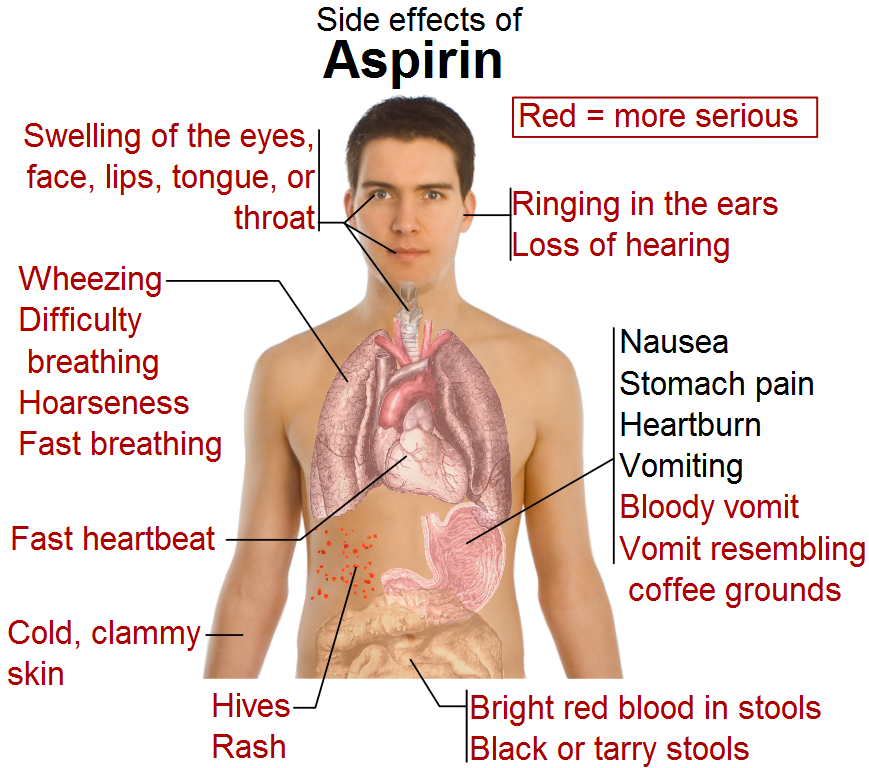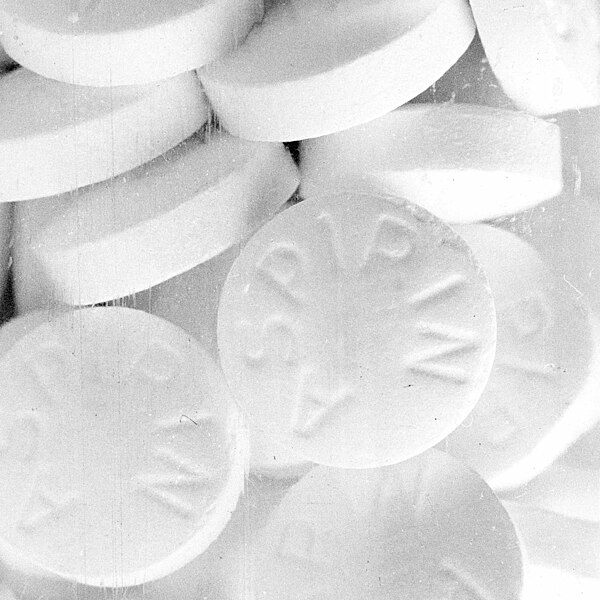
Credit: Mikael Häggström / Wikimedia Commons
Nearly 30 million Americans older than 40 take aspirin daily to prevent cardiovascular disease.
More than 6 million Americans take aspirin daily without physician’s recommendation.
Nearly half of Americans more than 70 years of age without cardiovascular disease, an estimate of nearly 10 million people, take aspirin daily – despite current guidelines against this practice.
Medical consensus once supported daily use of low dose aspirin to prevent heart attack and stroke in people at increased risk for cardiovascular disease (CVD). But in 2018, three major clinical trials cast doubt on that conventional wisdom, finding few benefits and consistent bleeding risks associated with daily aspirin use. Taken together, the findings led the American Heart Association and American College of Cardiology to change clinical practice guidelines earlier this year, recommending against the routine use of aspirin in people older than 70 years or people with increased bleeding risk who do not have existing cardiovascular disease.
Aspirin use is widespread among groups at risk for harm including older adults and adults with peptic ulcers – painful sores in the lining of the stomach that are prone to bleeding that affect about one in ten people. In a research report published today in Annals of Internal Medicine, researchers from Beth Israel Deaconess Medical Center (BIDMC) report on the extent to which Americans 40 years old and above use aspirin for primary prevention of cardiovascular disease.
“Although prior American Heart Association and American College of Cardiology guidelines recommended aspirin only in persons without elevated bleeding risk, the 2019 guidelines now explicitly recommend against aspirin use among those over the age of 70 who do not have existing heart disease or stroke,” said senior author Christina C. Wee, MD, MPH, a general internist and researcher at BIDMC and Associate Professor of Medicine at Harvard Medical School. “Our findings suggest that a substantial portion of adults may be taking aspirin without their physician’s advice and potentially without their knowledge.”
Crystals of aspirin in polarized light through microscope

Credit: Ing. Lucia Dovalová / Wikimedia CommonsUsing data from the 2017 National Health Interview Survey (NHIS), a nationally representative survey of U.S. households conducted before the release of the new guidelines, Wee and colleagues characterized aspirin use for primary prevention of CVD. The team found that about a quarter of adults aged 40 years or older without cardiovascular disease – approximately 29 million people – reported taking daily aspirin for prevention of heart disease. Of these, some 6.6 million people did so without a physician’s recommendation.
Concerningly, nearly half of adults 70 years and older without a history of heart disease or stroke reported taking aspirin daily. The authors noted that a history of peptic ulcer disease – another contraindication for the routine use of aspirin – was not significantly associated with lower aspirin use as one would have expected.
“Our findings show a tremendous need for health care practitioners to ask their patients about ongoing aspirin use and to advise them about the importance of balancing the benefits and harms, especially among older adults and those with prior peptic ulcer disease,” said lead author Colin O’Brien, MD, a senior internal medicine resident at BIDMC and fellow at Harvard Medical School.

Credit: Sauligno / Wikimedia CommonsCoauthor, Stephen Juraschek, MD, PhD, a primary care physician at BIDMC, cautions that “these findings are applicable to adults who do not have a history of cardiovascular disease or stroke. If you are currently taking aspirin, discuss it with your doctor to see if it is still needed for you.”
Juraschek, who is also an Assistant Professor at Harvard Medical School, is supported by grant K23HL135273 from the National Heart, Lung and Blood Institute of the National Institutes of Health. Disclosures can be viewed online at www.acponline.org.
Contacts and sources:
Lindsey Diaz-MacInnis
Beth Israel Deaconess Medical Center
Citation: Prevalence of Aspirin Use for Primary Prevention of Cardiovascular Disease in the United States: Results From the 2017 National Health Interview Survey.
Colin W. O’Brien, Stephen P. Juraschek, Christina C. Wee. Annals of Internal Medicine, 2019; DOI: 10.7326/M19-0953
Disclaimer: We at Prepare for Change (PFC) bring you information that is not offered by the mainstream news, and therefore may seem controversial. The opinions, views, statements, and/or information we present are not necessarily promoted, endorsed, espoused, or agreed to by Prepare for Change, its leadership Council, members, those who work with PFC, or those who read its content. However, they are hopefully provocative. Please use discernment! Use logical thinking, your own intuition and your own connection with Source, Spirit and Natural Laws to help you determine what is true and what is not. By sharing information and seeding dialogue, it is our goal to raise consciousness and awareness of higher truths to free us from enslavement of the matrix in this material realm.
 EN
EN FR
FR


























I saw it first hand for many years patients being admitted for GI bleed and the only medication they take is ASA. Even when the Rockefeller AMA decreased the “maintenance dose” to the baby ASA (80 mg), I did not see any change. What I regret most about retiring from the medical cartel industry is my not being able to see anymore firsthand the effects of medications on patients. Eliquis is the last medication I observed to be so scary. Many nights we ran out of blood to transfuse to the patients who were losing them just as fast as we were transfusing them. Vitamin K, platelets, etc. were not reversing the effects of Eliquis. Society is so dumbed down and programmed to accept just about anything Big Pharma sells. After all, the stupid box says it is good for you. Every day we are bombarded with pharmaceutical ads. I cringe for those who do not even give these medications a second thought before taking them.
ABSOLUTELY FALSE information! They are getting desperate! I take, somedays 10/15 aspirins a day! In extreme pain days I’ve taken 25! This is CONSTANLY FOR YEARS! None of those effects (or even close happen). These are the effects caused by prescibed medications (my mom has almost all of them). You can use aspirin it for any reason, pain, or just feeling better. One adult aspirin is not enough. Well, to start to take one you will probably not feel a difference. Two or Three will make you feel better (at aroud the 10/15 minute mark). What you should not take are Tylenol or other killing poisons (prescribed or not). Best prices, I’ve found, are in Amazon less than $5 for bottles of 500 aspirins.